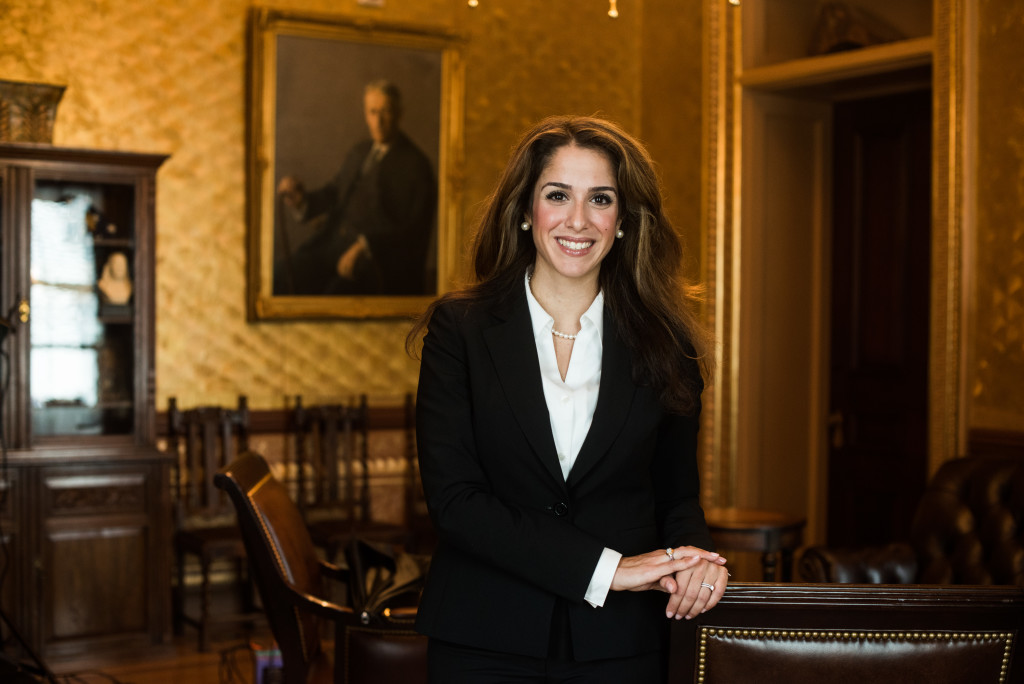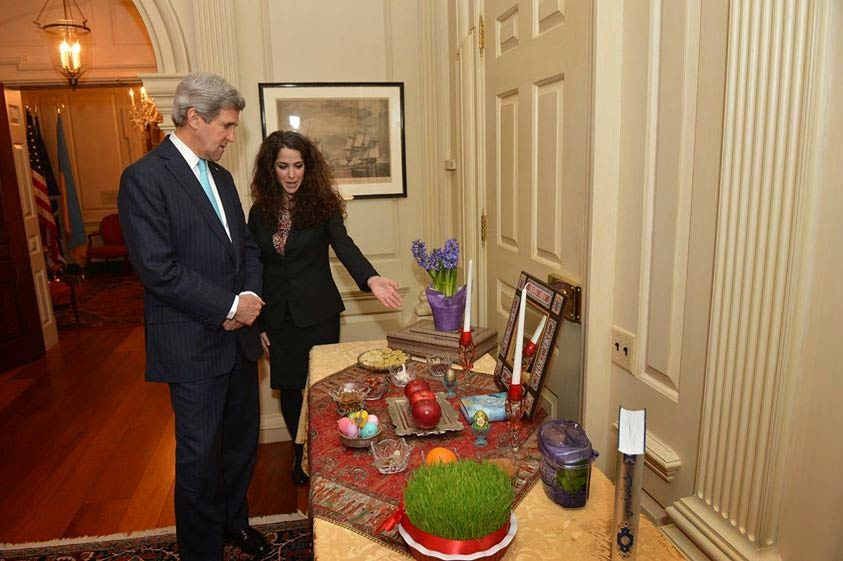Sahar Nowrouzzadeh: If You Are Truly Passionate About Something, Ignore The Glass Ceilings
In the height of historic nuclear negotiations with Iran in March 2015, President Obama held an important video conference in the situation room with top diplomats and national security advisors. Among participants in that historic meeting was one Iranian-American, Sahar Nowrouzzadeh, National Security Council Director for Iran. She was the same official in State Department photos the year before, explaining the Persian New Year’s Haft Sin table to John Kerry. Sahar entered public service over a decade ago and has created an impressive career in foreign policy ever since. I talked to her about her life growing up as an Iranian-American woman and how she made it this far.
Tell us about your life. How was it growing up as an Iranian-American?
In the early 1970's, my parents immigrated from Iran to Connecticut, where I was born in 1982. They came to the United States so that my father could complete his medical residency as an OBGYN. Unfortunately, he passed away when I was just a few years old. My mother raised my siblings and I on her own, working multiple jobs to send us to private schools. That's how we became prepared for our educations and careers. My mother instilled an incredible work ethic, value for education and appreciation for the American way of life in me and my siblings.
The Iranian-American community in Connecticut is not nearly as large as the communities you will find in California, New York, etc… That said, we had many Iranian-American family friends growing up. Many of their children were like cousins to me and my siblings. At school I was, for the most part, the only Iranian-American. It was fun being able to share my heritage with my friends, who were from all different backgrounds. They loved learning about Iranian culture, eating Persian food at our house (especially tadig!), and learning bits and pieces of the Persian language.

Where did you go to school and what did you study?
I completed my Bachelor's degree in International Affairs with a double concentration in Middle East Studies and International Economics at George Washington University. I completed my Master's degree in Persian Studies at the University of Maryland, College Park.
Politics and especially foreign policy is still a male dominate industry. Why did you decide to get into politics? Is anyone is your family into politics? Was your family supportive or reluctant?
No one in my family has pursued a career in politics. Most of my family members have careers in medicine, engineering, mathematics, the sciences or law. I too had planned on going to medical school as I wanted to follow in my father's footsteps and become an OBGYN but I also had a lifelong interest in other cultures and languages. The compromise I reached with myself was that I would be an International Affairs major but would take all of the required courses to apply to medical school. After the tragic events of September 11 and having just moved to Washington, D.C. when they took place and after over a year of pre-med coursework that I didn't really enjoy on the one hand and International Affairs coursework that I found fascinating on the other, it became clear that my true passion was foreign policy.
It did take some time for my mom to accept my decision to not go to medical school and to pursue a career in foreign affairs instead. For quite a few years even after I graduated from college she would ask me: "Are you absolutely sure you don't want to go to medical school? You would be an excellent doctor." She just wanted to ensure that I would not only be able to have a positive impact on the lives of others but also be able to make a good living. It was definitely an education process -- one that I think many second generation Iranian-Americans can relate to -- but today she is very proud of my service.
Tell us about your career path. Where did you start your work and how did you climb up the ladder to such an impressive level?
I began my career in public service about 11 years ago. After completing my Bachelor's degree in 2005, I entered the Department of Defense, where I served as a Foreign Affairs Analyst. After several years of service, I became a Senior Foreign Affairs Analyst, and later became a Team Chief. Then I joined the State Department as a Foreign Affairs Officer and a few years later was detailed to the National Security Council at the White House, where I've been serving since 2014.
What do you exactly do right now? Tell us about a day at Sahar's work.
I am currently detailed from the State Department to the National Security Council staff at the White House, serving as a Director for Iran and Iran Nuclear Implementation. The NSC is the President's principal forum for considering national security and foreign policy matters with senior national security advisors and cabinet officials. The NSC is also responsible for coordinating these policies among various government agencies. I assist in coordinating various aspects of our Iran policy among government agencies, producing research, briefings, and memos related to Iran for our senior leadership and conducting the day-to-day management of our Iran policy.
What has been your favorite organization so far? What do you like the most about your job?
I have enjoyed all of the positions I have held in public service but it has been an extraordinary experience to serve on the National Security Council staff at the White House over the past two years and at such a historic time in U.S.-Iran relations. It's been both the most challenging and rewarding position I have held thus far and I've experienced a tremendous amount of professional growth in this position.
It's difficult to pick the one aspect of my job that I like the but in addition to having the honor of working for and with such an incredible group of people, I would say it is knowing that the work my colleagues and I are doing on a daily basis can truly make a difference in the lives of so many. It's a responsibility we do not take lightly but are all honored to bear.
Will you stay at the White House after President Obama leaves? What is next for you? Where do you see yourself in 5-10 years?
While I am a career civil servant and not a political appointee, I am approaching the end of my detail to the NSC and will be returning to the State Department soon. Upon my return to the State Department, I will be joining the Secretary of State's Policy Planning Staff. I see myself continuing a career in public service, perhaps completing a PhD and possibly teaching at a University down the road.

What is your advice for young Iranian-American women who aspire to follow your path and get into politics? What should they do and what should they avoid?
Everyone's path is different but I've found that if you're truly passionate about something, then you should absolutely follow your passion, regardless of the so called "glass ceilings" you may see ahead -- whether imposed by one's family, society or community. Identify the topic or issue that you're most interested in and start volunteering or applying for positions at the agencies and organizations who work on that topic or related issues. See where you land and even if you don't get your dream job off the bat, go in, give it your all and make the most of the experience.
As with any career, there will be ups and downs along the way but always try to maintain a positive attitude and remain patient. Be a true team player and work as hard as you can not just for yourself but for the greater good. Never lose sight of your goals, even if you experience setbacks. Meet deadlines. And keep learning in your spare time. Read books and publications that reflect a variety of viewpoints on the issues you are most focused on.
Negar Mortazavi is an Iranian-American journalist and commentator based in New York City. She comments on Iranian politics and society on national and international media including BBC, Al Jazeera, NPR, Huffington Post, and CCTV. In 2014 the Guardian named her among top 10 people to follow on Twitter for news about Iran. From 2009 to 2013 she worked at Voice of America television where she hosted Straight Talk, a daily hour-long interactive show on current affairs. Negar was born and raised in Tehran and moved to the United States in 2002 to continue her studies. She has a Bachelor of Arts from the University of Massachusetts and a Master's in International Development from Brandeis University. She tweets at @NegarMortazavi

